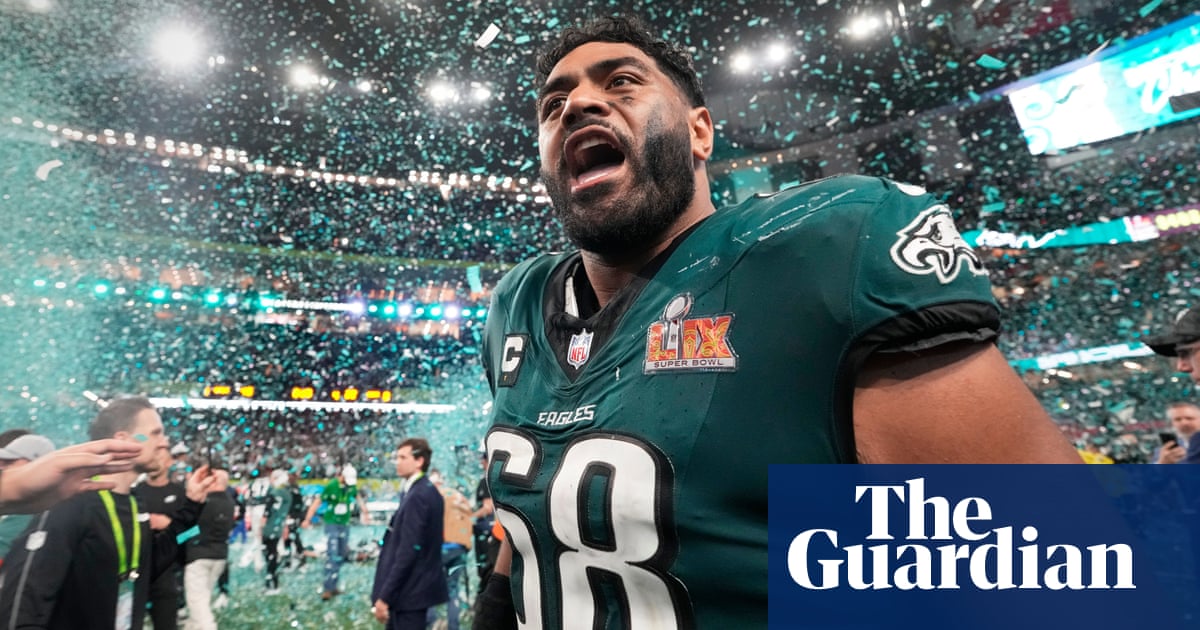Dani Carvajal, Antonio Rüdiger, David Alaba, Éder Militão and Marcelo were in the team photo before the Madrid derby at the Bernabéu on Saturday night. A seriously impressive defence, it was just a pity they weren’t playing. Instead, Marcelo was there so they could pay homage to the full-back, who won 25 trophies with the club, in the week he announced his retirement. The other four had come to join him and support their teammates. None were dressed in white; all are injured.
All of which would be bad enough, but it was about to get worse. The following afternoon, having been named in the squad to travel to Manchester, the captain pulled out too. In the past fortnight Lucas Vázquez had missed visits to Valladolid and Leganés as a precaution but eventually he too fell, calling from home after Sunday’s training session to say something wasn’t right in his thigh. He was the backup, a midfielder at full-back, albeit one who has played there for so long now that it has become his default role. There have been 36 injuries at Madrid this season, 26 of them muscular.
There had been something emotional in the way Carlo Ancelotti talked about those pre-match moments, something vindicatory too. In welcoming his injured players into the dressing room, he had drawn a conclusion and put together a defence of his own. “Before the game I saw Carvajal, Alaba, Militão and Rüdiger greeting their teammates; despite the difficulties we’re doing very well,” he said. By the end of the match, which ended 1-1, Madrid were still top, they are in the semi-final of the Copa del Rey, and they qualified for the Champions League playoffs, which certainly isn’t bad, considering.
Ancelotti has called this a “total emergency”. When he comes to select his defence to face Manchester City at the Etihad, he will have two left-backs: Fran García and Ferland Mendy. Apart from that, he only has one actual defender: Raúl Asencio, a 21-year-old academy product in his debut season in the first team, for whom he has already played 19 games.
That is according to the coach, anyway. In fact, Ancelotti also has Jesús Vallejo, the strange case of the central defender included in every squad, who sits on the bench every game but never comes on and doesn’t get mentioned by his manager. Vallejo has played once all season, coming on by popular and frankly tongue-in-cheek demand against Alavés with the team 3-0 up in a game they almost let slip, eventually winning 3-2. Before that he hadn’t played for Madrid since a brief, successful cameo at the Etihad two seasons earlier.
Then there is Aurélien Tchouaméni, the central midfielder at centre-back, where he has played 14 of his 29 matches. Two more academy players have also been called up: Jacobo Ramón, who has played twice this season, and Lorenzo Aguado, who has made three appearances as a substitute but is still unlikely to play at right‑back. That will almost certainly be another midfielder: the Uruguayan Fede Valverde. The problem there is not so much having Valverde at full-back as not having him in midfield.
Seen from Ancelotti’s position particularly – aware he is always the weakest link, the first to fall, and having to manage upwards as well as downwards – it is not surprising he says Madrid are doing well. He knows that not everyone sees it like that – which is one of the reasons why he says so. Last season Madrid lost only twice all year, both times to Atlético; this season, they have lost seven times already. When it has come to the big games, the best opponents, they have not won, and often not competed as they should.
Only Dortmund have been defeated, which took a wild comeback in the second half after a dreadful first, and do they still count? Barcelona put nine past them in two games. Athletic beat them at San Mamés. Liverpool overran them. Milan were superior at the Santiago Bernabéu. They drew both derbies with Atlético. And now they have City.
It doesn’t get bigger: these sides have met four times in the past five seasons and on three of those occasions the winner has lifted the trophy. That is the theory, at least. But the fact they are playing each other at all tells a story too. Madrid have been beaten three times in the Champions League. Ancelotti said he would have preferred City to have been knocked out, to have avoided them, saying: “We don’t like it.” If the good news is that City are even worse, that is of limited comfort.
This is not solely about injuries, though Ancelotti will look at that list and wish they could have been spread around the pitch. He would probably have preferred to lose a forward than rack up all the absentees in defence. Kylian Mbappé, Vinícius Júnior, Rodrygo and Jude Bellingham have scored more than 60 goals between them. After a difficult start, Mbappé has been superb – he collected the award for January’s player of the month on Saturday and has 13 goals in 14 games – and Rodrygo has been outstanding, scoring seven and providing four since the turn of the year.
But the balance has been difficult. Structurally Madrid have suffered. For all those goals and recent improvements, the suspicion remains that against the best it is not enough. At times there has been a kind of 4-2-4, a gap opening in the middle. That makes Tchouaméni’s move to defence, instead of a protective role in front, significant. It makes Valverde playing at full-back even more significant; if there is a player that can cover those wide spaces, plugging endless gaps, it is him. It also leaves Madrid with few central midfield options: Dani Ceballos, Luka Modric and Eduardo Camavinga, who is returning from injury.
after newsletter promotion
It has been hard to avoid the feeling that the coach would prefer to add an extra man, or men, in midfield as he continues to seek a solution. He would also like to maintain the talent on the pitch, which is both politically expedient and, well, these are the players that win you games. Why would you leave out footballers this good? Madrid may have the three best players in the world. Nor has the alternative always worked: a midfield four didn’t help at Anfield; at San Mamés, Vinícius was missing but still Athletic poured through them.
Earlier in the season, criticised for a lack of control, Ancelotti said he preferred a bit of rock and roll. In a straight fight, an open match with both teams slugging it out, Madrid would assume they have an advantage. When they are under pressure, history shows they can still land the key blow, especially against City. If, that is, they can defend themselves – and that has been Ancelotti’s obsession, both publicly and privately, all season.
At the end of the derby, Ancelotti was asked what lessons he could take into the City game. “That the formula can work,” he said. The first half had been poor but the second was much improved; at half-time he had warned them that either they do what they had agreed or he would start hauling players off, whoever they were. He had created four lines, with Bellingham shifted left and Rodrygo right, at least without the ball. Vinícius and Mbappé had been left up front although Ancelotti spent much of the game shouting for the Brazilian to go wide, not inside, and insisted afterwards they had helped press.
For Ancelotti the question is more basic. From the very start of the season he has been uneasy; on the opening night he said he felt they lacked commitment, work rate and sacrifice. Although he has been cautious in how he expresses it, that concern remains and is occasionally voiced. But it is natural to hold on to the idea that the message will get through or that this is an issue that solves itself, fixed by the sheer size of the game, its importance, the motivation. If there is a moment to run, to sacrifice, it is in Manchester. If there is a time for the talent to show, that time is now.
“I don’t have the idea of seeking balance by taking off one, two, three, four forwards,” Ancelotti said. “I put on four midfielders, I seek balance, I press more … but I don’t score 60 goals. Simple.”
Article by:Source: Sid Lowe












